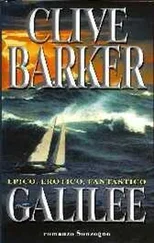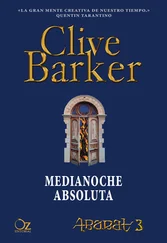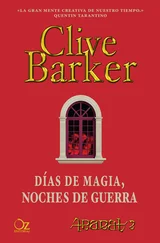Clive Barker - Sacrament
Здесь есть возможность читать онлайн «Clive Barker - Sacrament» — ознакомительный отрывок электронной книги совершенно бесплатно, а после прочтения отрывка купить полную версию. В некоторых случаях можно слушать аудио, скачать через торрент в формате fb2 и присутствует краткое содержание. Жанр: Фантастика и фэнтези, на английском языке. Описание произведения, (предисловие) а так же отзывы посетителей доступны на портале библиотеки ЛибКат.
- Название:Sacrament
- Автор:
- Жанр:
- Год:неизвестен
- ISBN:нет данных
- Рейтинг книги:5 / 5. Голосов: 1
-
Избранное:Добавить в избранное
- Отзывы:
-
Ваша оценка:
- 100
- 1
- 2
- 3
- 4
- 5
Sacrament: краткое содержание, описание и аннотация
Предлагаем к чтению аннотацию, описание, краткое содержание или предисловие (зависит от того, что написал сам автор книги «Sacrament»). Если вы не нашли необходимую информацию о книге — напишите в комментариях, мы постараемся отыскать её.
Sacrament — читать онлайн ознакомительный отрывок
Ниже представлен текст книги, разбитый по страницам. Система сохранения места последней прочитанной страницы, позволяет с удобством читать онлайн бесплатно книгу «Sacrament», без необходимости каждый раз заново искать на чём Вы остановились. Поставьте закладку, и сможете в любой момент перейти на страницу, на которой закончили чтение.
Интервал:
Закладка:
When she'd gone, Will opened the study door and peered in. The curtains were partially drawn, a shaft of sunlight falling across the littered desk and onto the threadbare carpet. Will stepped into the room, breathing the scent of books and old cigarette smoke. This had been Hugo's fortress: a room of great men and great thoughts, he'd been fond of saying. The shelves, which covered two full walls from floor to ceiling, were crammed with books. All the usual suspects: Hegel, Kierkegaard, Hume, Wittgenstein, Heidegger, Kant. Will had peered into a couple of these volumes in his youth - a last forlorn attempt to find favour with Hugo -but the contents had been as incomprehensible to him as a page of mathematical equations. On the antique table to the left of the window, the second great collection this room boasted: a dozen or more bottles of malt whisky; all of them rare, and all savoured when the study door was closed and Hugo was alone. He pictured his father now, sitting in the battered leather chair behind his desk, sipping and thinking. Had the whisky eased his understanding of the words, he wondered; had his mind slid through the forests of Kant more speedily when slickened by a single malt?
He crossed to the desk, where a third collection was gathered: Hugo's brass paperweights, seven or eight of them, set upon various piles of notes. If any private correspondence with Eleanor survived it would be here in one of the drawers. But he doubted its existence. Even assuming his parents had once been so in love as to exchange passionate billets-doux, he could not imagine Hugo preserving them after the separation.
There was a sheaf of papers lying on the blotting pad in the middle of the desk. Will picked them up, and flipped through them. They seemed to be notes for a lecture; every other word contested, scribbled and rewritten, portions of the text so densely annotated it was virtually indecipherable. Opening the curtain a little wider to shed a better light on the desk, he sat down in his father's chair and studied the chaotic sheets, piecing the sense of the text together as best he could.
We deal daily with the squalid facts of our animality, Hugo had written, putting (illegible) a process of self-censorship so engrained we can no longer see it at work. We do not examine the excrement in the bowl or the phlegm in the handkerchief for moral or ethical (he had first written spiritual in place of ethical, but struck it out) indicators. There followed a paragraph that he had excised completely, cross-hatching it in his fervour to erase it. When the text picked up again, it was clearer, but still problematic:
Tears, we may allow, carry a measure of emotional significance. In certain (illegible) sweat may be ... (illegible) But as scientific methodologies become increasingly sophisticated, their tools charting and (calibrating, was it? or calculating; one of the two) the nuances of the phenomenal world with an accuracy that would have been unthinkable a decade ago, we are obliged to reconfigure our assumptions. Chemical signifiers - the sap that oozes from our flesh and organs in response to emotional activity- may be found in all our waste products. Beside this he had scrawled three question marks, as though he was here doubtful of his facts. He ploughed on with his thesis nevertheless:
Emotion, in other words, resides in the most despised matter in our local parameters, and it will soon be within the realm of instrument sensitivity that the precise emotional source of these signifiers may be discovered. In short, we will be able to recognize a quality of mucus that carries traces of envy; a sample of sweat containing evidence of our rage; a portion of excrement which may be dubbed loving.
The perverse wit of his father's construction brought a smile to Will's lips; the way that last sentence had been cunningly constructed, phrase by phrase, to climax in the inevitable collision of the sublime and the abject. Had Hugo seriously intended to deliver this to his students? If so, it would have been quite a sight, Will thought, seeing the import of what they were being told dawn on them.
There followed two and a half paragraphs that had been scratched out, and then Hugo had taken up his argument in an even more unlikely direction, his language growing steadily more ironic. How are we to read and interpret these glad tidings? he'd written, This curious interface between emotions that we hold in high esteem and the muck which our bodies ooze and expel? In passing these chemical signifiers into the living and sensitive matrix of a world which it pleases us to characterize as neutral, are we perhaps influencing it in ways neither our sciences nor our philosophies have hitherto recognized? And further, in reconsuming the products of this now-tainted reality as food, are we at some presently indiscernible level continuing a cycle of emotional consumption: dining, as it were, on a salad dressed with other men's emotion?
At the very least, let us admit the possibility that our bodies are a kind of market-place, in which emotion is both the coin and the consumable. And if we dare a braver stance, consider that the terrain we have dubbed our inner lives is, in a fashion we cannot yet analyze or quantify, affecting the so-called outer or exterior world at such a subtle, but all-pervasive level that the distinction between the two, which depends upon a clear definition of a non-sentient, material state and us, its thinking, emoting overlords, becomes problematic. Perhaps the coming challenge is not, as Yeats had it, that 'the centre will not hold', but that the boundaries are blurring. All that constituted the jealously defined expression of our humanity - our private, passionate selves - is in truth a public spectacle, its sights so universally manifested, and so commonplace, that we can never gain the necessary distance to separate ourselves from the very soup in which we swim
Strange stuff, Will thought, as he laid the sheets back on the blotting pad. Though the word spiritual had been very severely ousted from the text, its presence lingered. Despite the dry humour, and chilly vocabulary of the text, it was the work of a man feeling his way towards a numinous vision; sensing, perhaps reluctantly, that his philosophies were out of breath, and it was time to let them die. Either that, or he'd written it dead drunk.
Will had lingered long enough. It was time he got on with the business of the day, the first portion of which was contacting Frannie and Sherwood. They needed to be told of events at the hospital, in case Steep came looking for them. Unlikely, perhaps, but possible. Returning to the living-room, Will found Adele busy on the phone, talking, he surmised, to the vicar. While he waited for the conversation to finish, he juggled the relative merits of delivering his message to the Cunninghams by phone or going down to the village to talk with them in person. By the time Adele had finished, he'd made his decision. This was not news to be delivered down the line; he'd speak to them face to face.
The funeral had been arranged for Friday, Adele told him, four days hence, at twothirty in the afternoon. Now that she had the date set she could start to organize the flowers, the cars and the catering. She'd already made a list of people to invite; was there anybody Will wanted to add? He told her he was sure her list was fine, and that if she was happy to get on with her arrangements he would take himself down to the village for an hour or so.
'I want you to bolt the front door when I'm not here,' he told her.
'Whatever for?'
'I don't want any ... strangers coming into the house.'
'I know everybody,' she said blithely. Then, seeing that he wasn't reassured, said: 'Why are you so concerned?'
He had anticipated her question and had a meagre lie prepared. He'd overheard a couple of nurses talking at the hospital, he told her: there was a man in the area who'd been trying to talk his way into people's homes. He then described Steep, albeit vaguely, so that she didn't become suspicious about the story. He was by no means certain he'd succeeded in this, but no matter: as long as he'd sowed sufficient anxiety to keep her from letting Steep in, he'd done all he could.
Читать дальшеИнтервал:
Закладка:
Похожие книги на «Sacrament»
Представляем Вашему вниманию похожие книги на «Sacrament» списком для выбора. Мы отобрали схожую по названию и смыслу литературу в надежде предоставить читателям больше вариантов отыскать новые, интересные, ещё непрочитанные произведения.
Обсуждение, отзывы о книге «Sacrament» и просто собственные мнения читателей. Оставьте ваши комментарии, напишите, что Вы думаете о произведении, его смысле или главных героях. Укажите что конкретно понравилось, а что нет, и почему Вы так считаете.










